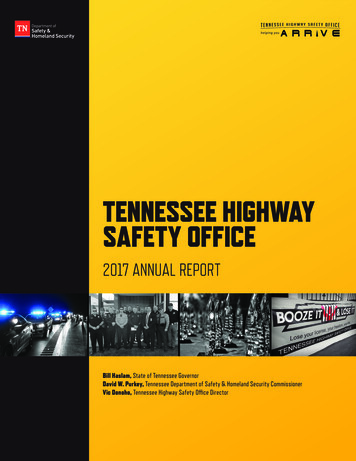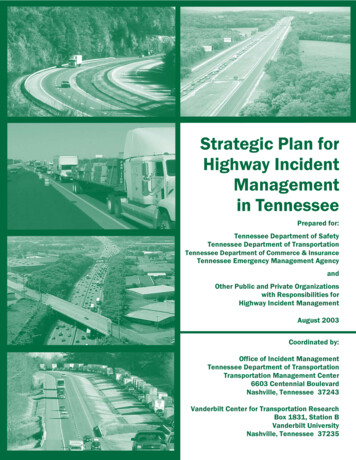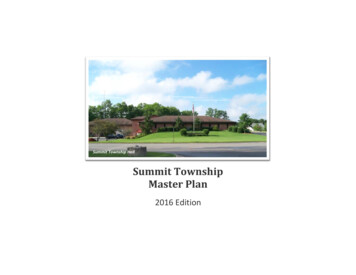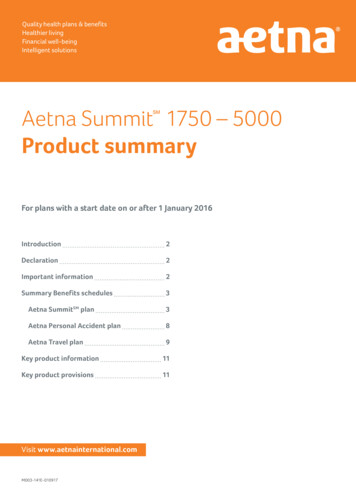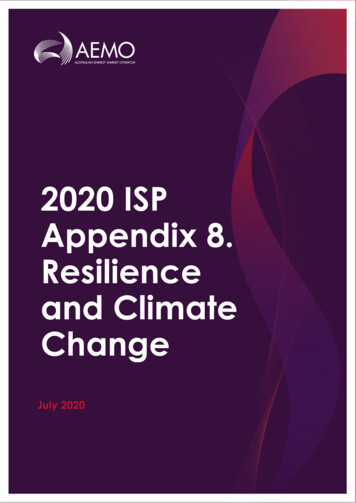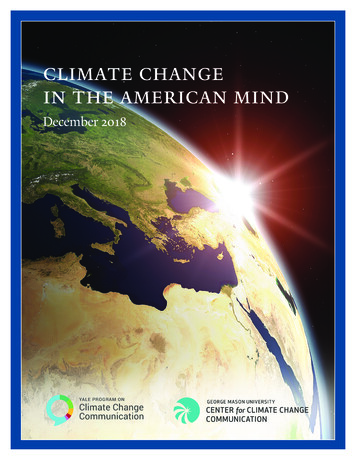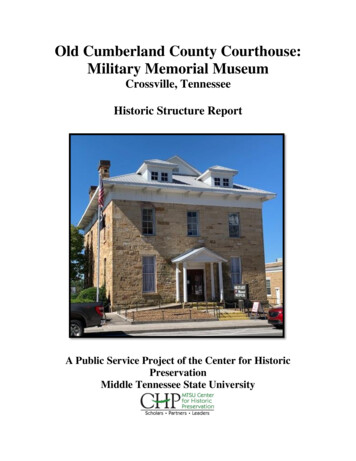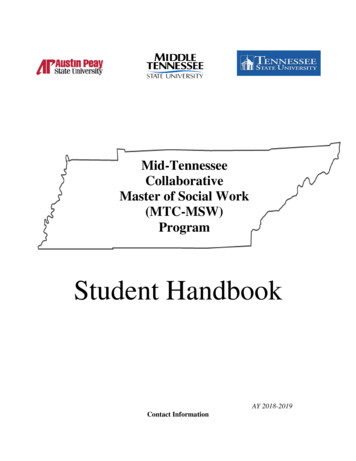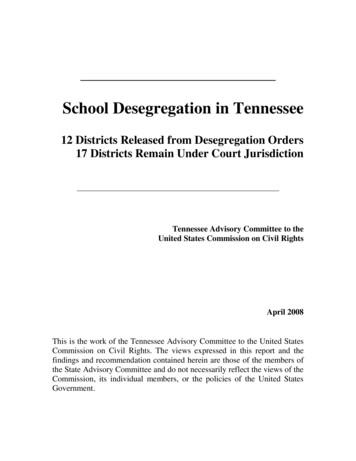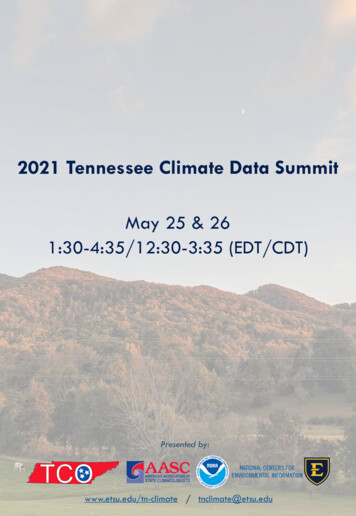
Transcription
2021 Tennessee Climate Data SummitMay 25 & 261:30-4:35/12:30-3:35 (EDT/CDT)Presented by:www.etsu.edu/tn-climate / tnclimate@etsu.edu
Improving Data Access & Services for Better Decision MakingAgenda At-A-GlanceRegistration/Zoom Link: bit.ly/TNCDSTuesday, May 251:30/12:30pm (EDT/CDT)Welcome: Summit Overview, Survey,& Southern Regional Climate Center1:40/12:40pmTennessee Climate Office: Current Services& Goals1:50/12:50pmState & Federal Agencies Panel on ClimateData & Decision Making2:20/1:20pmNational & Regional Climate Services (NOAA)3:20/2:20pmBreak3:30/2:30pmRegional Tools & Discussion (Drought, USGS,& USDA)4:30/3:30pmClosing & Overview for WednesdayWednesday, May 261:30/12:30pm (EDT/CDT)Local Issues & Sector Breakout Session2:15/1:15pmState Climate Offices & Climate Monitoring3:15/2:15pmBreak3:25/2:25pmUniversity Research & Services (UT-K, MTSU,TSU, Vanderbilt, Memphis)3:55/2:55pmRegional Tools & Discussion (SE RegionalClimate Center & National Weather Service)4:30/3:30pmClosing & Next Steps
Improving Data Access & Services for Better Decision MakingTuesday, May 251:30/12:30pmWelcome: Summit Overview, Survey, & Southern RegionalClimate CenterGlenn Kerr (glenn.kerr@stateclimate.org) is the Executive Director for theAmerican Association of State Climatologists (AASC). Previously, he served asthe Commander of the 14th Weather Squadron for the United States Air Forceas well as the Weather Division Chief for the Air Force Operations Group atthe Pentagon.John Nielsen-Gammon (n-g@tamu.edu) is a Regents Professor of AtmosphericSciences at Texas A&M University. He has served as the Texas StateClimatologist since 2000, and is now Director of the NOAA Southern RegionalClimate Center and on the Executive Committee of the American Association ofState Climatologists.1:40/12:40pm Tennessee Climate Office: Current Services & GoalsAndrew Joyner (joynert@etsu.edu) is an Associate Professor of Geosciences atEast Tennessee State University. He established the Tennessee Climate Office(TCO) in 2016 and became the official Tennessee State Climatologist inJanuary 2021. Additionally, he is the Director of the Geoinformatics andDisasters Science (GADS) Lab and much of his research focuses on hazardmitigation/analysis, biogeography, geospatial analysis, and public health.William Tollefson (tollefson@etsu.edu) is a Lecturer of Geosciences at EastTennessee State University and the Tennessee Assistant State Climatologist.Since 2017, he has created statewide monthly climate reports and provideddrought status input for the US Drought Monitor. He is also the Director ofGeospatial & Hazards Analysis for the Geoinformatics and Disaster Science(GADS) Lab.
Improving Data Access & Services for Better Decision MakingTuesday, May 25 (Continued)1:50/12:50pmState & Federal Agencies Panel on Climate Data& Decision MakingKendra Abkowitz Brooks (Kendra.Abkowitz@tn.gov) is Director for the Officeof Policy and Sustainable Practices. Kendra leads the department’s efforts toengage in environmental policy research and analysis and provide technicalguidance to business, industry, communities and other entities to promoteenvironmental stewardship, sustainability and resilience. She regularly engageswith federal agencies on new initiatives, proposed rulemakings and otherenvironmental policies that may impact TDEC’s programs and collaborates withstate and local leaders, non-governmental organizations and the academic andbusiness community to exchange views on matters relevant to environmentalpolicy and sustainability. Prior to working at TDEC, Kendra served as aSustainability Professional at Vanderbilt University, where she designed,implemented, and managed numerous sustainability programs with the aim ofreducing environmental impacts resulting from operations within the Universityand Medical Center and at campus special events. Kendra holds a PhD inEnvironmental Management and Policy and a Bachelor’s Degree in Economicsand Sociology from Vanderbilt University, a MBA from Middle Tennessee StateUniversity, and a Master’s Degree in Sociology from the University of Chicago.Kyle Spangle (Kyle.Spangle@tn.gov) is the technical lead for the Division ofAir Pollution Control’s air quality measurements and forecasting groups. Kylehas a B.S. in Meteorology from Purdue University and has 13 years ofexperience in the field of environmental science.David Borowski (David.M.Borowski@tn.gov) is an EnvironmentalEpidemiologist in the Environmental Epidemiology Program at the TennesseeDepartment of Health
Improving Data Access & Services for Better Decision MakingTuesday, May 25 (Continued)1:50/12:50pmState & Federal Agencies Panel on Climate Data& Decision Making (Continued)Lisa Huff (Lisa.Huff@tn.gov) grew up in Knoxville, Tennessee, south of the river,has lived in various states of the South, and has traveled all over NorthAmerica and parts of Europe and Africa. She has worked in her field since theearly 1980s, starting out with seasonal interpretive positions within TennesseeState Parks. Just prior to obtaining her Bachelor of Science she worked in theGreat Smoky Mountains National Park on the first wild hog study undertakenthere. She then took a short internship at Land Between the Lakes beforeworking at the Savannah River Ecology Laboratory doing research on woodstorks for the University of Georgia. While working on the wood stork project,she took time to go to Spain, where she helped a former colleague search forthe last European brown bears in the Picos de Europa. Before attendinggraduate school, she did a brief stint as a biologist sampling trawler hauls inthe Bering Sea for the National Marine Fisheries Service. After obtaining hergraduate degree, Lisa worked as an environmental scientist for two firms inNorth Carolina’s Research Triangle Park where she primarily conductedresearch on greenhouse gas source locations and emissions estimations for theU.S EPA. She then took a position with the N.C. Division of CoastalManagement directing the development of their nonpoint source pollutioncontrol program. Lisa began working for Tennessee State Natural Areas in2000. She is tasked with the daily operations and management - either solelyor jointly with managing partners - of over 42,000 acres in 21 East Tennesseenatural areas.Brian Childers (bachilders0@tva.gov) is a native of Knoxville, and now worksfor TVA in Chattanooga. He attended the University of Tennessee in Knoxvilleand Penn State, studying economics, political science, and business analytics. Hebegan his career with TVA’s load forecasting group in 2019, contributing tounderstanding weather-related load risks. He also helped model a long-termclimate change scenario for the TVA system with the help of ORNL’s ClimateChange Climate Institute. Last year, he contributed to measuring andforecasting COVID impacts on the TVA’s load forecasts. He recently moved toTVA’s Advanced Analytics group.William Terry (William.C.Terry@usace.army.mil) is the Chief of the WaterResources Section at the United States Army Corps of Engineers-NashvilleDistrict
Improving Data Access & Services for Better Decision MakingTuesday, May 25 (Continued)2:20/1:20pmNational & Regional Climate Services (NOAA)Doug Kluck (doug.kluck@noaa.gov) is the NOAA Regional Climate ServicesDirector for the Central Region. He works closely with the Regional ClimateCenters, state climatologists, tribal colleges and universities, land grantuniversities and extension services, federal and state governments, andnongovernmental organizations on a number of issues, including informingadaptation, climate data stewardship, building climate change capacity, andassessment of climate services needs by sector and community.Victor Murphy (victor.murphy@noaa.gov) has served as the NOAA NationalWeather Service (NWS) Southern Region Climate Service Program managersince 2002. Located in Fort Worth, the NWS Southern Region includes 33weather forecast offices and four river forecast centers. Dr. Murphy overseesthe daily ingest and publication of climate data from the volunteer COOPnetwork and more official sources. He also oversees the issuance of routinedaily and monthly climate products, which includes calculations of temperaturesand precipitation.Adam Smith (Adam.Smith@noaa.gov) is lead scientist for NOAA NationalCenters for Environmental Information’s (NCEI’s) U.S. Billion-dollar Weather andClimate Disasters. Over the last decade, he has led research, developed newdata partnerships, and gained national and international experience mergingenvironmental and social-science data into research tools for studying theimpacts and costs of natural disasters.
Improving Data Access & Services for Better Decision MakingTuesday, May 25 (Continued)3:30/2:30pmRegional Tools & Discussion (Drought, USGS, & USDA)Mark Svoboda (msvoboda2@unl.edu) is a climatologist by training and hasbeen with the National Drought Mitigation Center at the University ofNebraska-Lincoln since its formation in 1995 and serving as director of theNDMC since 2016. He co-founded the weekly U.S. Drought Monitor andauthored the map for 17 years. Mark has worked closely with local, state,basin, federal, tribal, and over 65 international organizations and governmentson drought monitoring early warning information systems, drought riskmanagement planning and various outreach, training, research and serviceactivities.Meredith Muth (meredith.f.muth@noaa.gov) is a Regional Drought InformationCoordinator for the National Integrated Drought Information System (NIDIS),which is part of the NOAA Climate Program Office. She coordinates theSoutheast Drought Early Warning System (DEWS), which is a collaborativefederal, regional, state, and local interagency effort to improve drought earlywarning capacity and build long-term drought resilience throughout the region.Michael Gavazzi (michael.gavazzi@usda.gov) is the coordinator for the USDASE Climate Hub, as well as a natural resource specialist for the USDA ForestService Eastern Threat Center. Michael has a master’s degree in forestry fromVirginia Tech and over 20 years of research experience studying the influenceof prescribed fire on fuel loads, and management and climate impacts onforest productivity. His current work focuses on delivering resources to helpproducers make climate-informed decisions.Ryan Boyles (rboyles@usgs.gov) is the Deputy Director of the Department ofInterior Southeast Climate Adaptation Science Center (SE CASC), one of thenine regional centers that form the National and Regional Climate AdaptationScience Center network. He is an applied climatologist focused on usingweather and climate science and data to support effective management ofnatural resources.
Improving Data Access & Services for Better Decision MakingWednesday, May 26Local Issues Panel & Sector Breakout Session: An interactivediscussion exploring how climate data from the Tennessee1:30/12:30pmClimate Office can best serve and be utilized by various sectors(Pick a Sector to join for discussion!)Non-Profits: Christine Hart (Christine.Hart@lung.org; Session Co-Lead) joinedthe American Lung Association in March 2018 where she strategizes,implements and manages initiatives to support the Healthy Air Campaign inTennessee, North Carolina and Pennsylvania. In her role, Ms. Hart works withhealth organizations and professionals to highlight the health impacts ofoutdoor air pollution and advocate for policies that curb climate change andimprove air quality. She graduated from the University of Minnesota withdegrees in Political Science and Communications Studies and also studied at theHigher Education Consortium for Urban Affairs, where she trained in grassrootsorganizing for social justice.Local Government: Morgan Dickie (morgan.dickie@nashville.gov; Session CoLead) has been an Environmental Health Specialist for the Metro Public HealthDepartment in Nashville, TN since 2018. She manages the quality assuranceprogram for MPHD’s Ambient Air Monitoring Program, which monitors theNashville area air quality and National Ambient Air Quality Standards(NAAQS) pollutants. She also helps coordinate the Tennessee Air Quality FlagProgram, aimed at spreading awareness for air quality among localcommunities. She has a degree in Environmental Science from AmericanUniversity, and a background working with non-profit organizations andinformal science education institutions.State/Federal Government: Jennifer Tribble (jennifer.tribble@tn.gov), SeniorPolicy Analyst in the Office of Policy and Sustainable Practices at theTennessee Department of Environment & ConservationHigher Education: Leah Dundon (leah.a.dundon@vanderbilt.edu), Director ofthe Vanderbilt Climate Change Initiative at Vanderbilt UniversityAgriculture: Connie Bowen (cbowen@aglaunch.com), Director of Innovationand Investment at AgLaunchPrivate Sector: Candace Listz (Candace.Listz@Nissan-Usa.com) Manager forProduct, Service, and Technical Training and President of the Nissan GreenTeam at Nissan North America
Improving Data Access & Services for Better Decision MakingWednesday, May 26 (Continued)2:15/1:15pmState Climate Offices & Climate MonitoringKathie Dello (kddello@ncsu.edu) is the State Climatologist of North Carolinaand the Director of the NC State Climate Office at NC State University. Shehas a PhD from Oregon State University. Kathie is grateful to serve the 10.5million citizens of North Carolina.Sytske Kimball (skimball@southalabama.edu) received her Ph.D. inMeteorology from the Pennsylvania State University in 2000. She joined thefaculty at the University of South Alabama in 1999 and became departmentchair in 2014. Dr. Kimball's research interests center around hurricanes, localweather, and weather instrumentation and observing. She started the SouthAlabama Mesonet in 2006.Sean Heuser (spheuser@ncsu.edu) is the ECONet Manager for the StateClimate Office of North Carolina. He manages, installs, and maintains anetwork of research weather stations across North Carolina and handles allordering and testing of sensors used for the network. Daily activities includemonitoring communication, performing quality assurance/quality control (QA/QC) on all data, and data analysis.Noah Newman (noah.newman@colostate.edu) is the education and outreachcoordinator for the Community Collaborative Rain, Hail and Snow (https://www.cocorahs.org/) network. He works with volunteers of all ages andbackgrounds and also leads the CoCoRaHS for Schools effort for teachers toimplement the project in their classrooms.
Improving Data Access & Services for Better Decision MakingWednesday, May 26 (Continued)3:25/2:25pmUniversity Research & Services (UT-K, MTSU, TSU, Vanderbilt,Memphis)Kelsey Ellis (ellis@utk.edu) is an Associate Professor in the Department of Geographyat the University of Tennessee. She is a hazards climatologist, specializing in risk andvulnerability analyses of hurricanes, tornadoes, flooding, extreme heat, and otheratmospheric hazards.Leah A. Dundon (leah.a.dundon@vanderbilt.edu) is the Director of the VanderbiltClimate Change Initiative. She is also a practicing environmental attorney with the lawfirm of Beveridge & Diamond, P.C., and holds a research appointment inenvironmental engineering at the Vanderbilt University School of Engineering. Leah ispart of a research group at Vanderbilt that focuses on climate change, riskmanagement, and assessing the impacts of extreme weather on infrastructureadaptation.Jianwei Li (jli2@tnstate.edu) is an Associate Professor in the Department ofAgricultural and Environmental Sciences at Tennessee State University. His researchseeks to understand how climate change factors alter soil microbial processes, and thedegree to which these changes feedback to long-term carbon and nutrients cycling insoils and terrestrial ecosystems (e.g., bioenergy cropland). His interdisciplinaryresearch integrates field and laboratory observations as well as modeling approachesto address questions that intersect external disturbances and terrestrialbiogeochemical cycles.Alisa Hass (Alisa.Hass@mtsu.edu) is an assistant professor in the Department ofGeosciences at Middle Tennessee State University. She specializes in appliedclimatology, biometeorology, and extreme heat.Dorian J. Burnette (djbrntte@memphis.edu) is an atmospheric scientist in theDepartment of Earth Sciences at the University of Memphis. After working as abroadcast and severe weather meteorologist for a TV station and private weathercompany in Wichita, Kansas, Dr. Burnette expanded into homogenization andreconstruction of historical climate records and dendroclimatology during graduateschool. He now uses a wide array of datasets to investigate extreme weather andclimate events at a variety of time scales and their impacts on society.Arleen A. Hill (aahill@memphis.edu) is a hazards geographer in the Department ofEarth Sciences at the University of Memphis. Arleen’s research focuses on managing/reducing impacts of disruptions to our society and environment associated withenvironmental hazards and vulnerabilities. She seeks to identify and address rootcauses of vulnerability and build resilience. Her projects are applied or engaged,multidisciplinary, and intentionally involve practitioners.
Improving Data Access & Services for Better Decision MakingWednesday, May 26 (Continued)3:55/2:55pmRegional Tools & Discussion (SE Regional Climate Center &National Weather Service)Chip Konrad (cek@email.unc.edu) is a Professor of Geography at theUniversity of North Carolina and the Director of NOAA’s Southeast RegionalClimate Center (SERCC), which provides operational climate service programsand expertise in climate science for the southeastern United States. SERCC isan operational climate service center that conducts research on climate in thesoutheastern United States and translates that research into operational toolsfor users. His research interests cover a wide range of areas in climatology andmeteorology, including heavy precipitation, tornadoes, hurricanes, cold airoutbreaks, heat waves and winter weather.Sam Shamburger (sam.shamburger@noaa.gov) is the Lead Meteorologist forthe NOAA National Weather Service Weather Forecast Office at Nashville,TN.Brandon Wasilewski (brandon.wasilewski@noaa.gov) is a Meteorologist forthe NOAA National Weather Service Weather Forecast Office at Morristown,TN and the office's Climate Focal Point.We hope you enjoyed the first ever Tennessee Climate Data Summit! Please reach out to the TennesseeClimate Office (TCO) if you have any questions or climate data/services needs.TCO website: www.etsu.edu/tn-climate /TCO email: tnclimate@etsu.eduWe would like to thank the American Association of State Climatologists (AASC) and the NOAA NationalCenters for Environmental Information (NCEI) for co-sponsoring and co-planning this event. We wouldalso like to thank Matthew Taylor and Kendra Abkowitz Brooks for coordinating the State & FederalAgencies Panel and Morgan Dickie and Christine Hart for coordinating the Local Issues Panel & SectorBreakout Session.
Tennessee State University and the Tennessee Assistant State Climatologist. Since 2017, he has created statewide monthly climate reports and provided drought status input for the US Drought Monitor. He is also the Director of Geospatial & Hazards Analysis for the Geoinformatics and Disaster Science (GADS) Lab.
